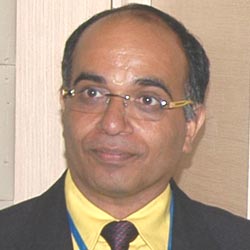Chennai-based Ramesh Bhat of AniRam talks to Cafemutual about his experiences as an IFA, the 7400 members’ online community ‘IFA Galaxy Group’ and his plans to launch an online distribution channel.
 How did you enter financial advisory business?
How did you enter financial advisory business?
I was working for a chartered accountancy company from 1987 to 1993. I was then handling the investment portfolio of the clients of my senior Sri Bheema Bhat. He is my mentor and made me understand financial products more apart from the income tax matters.
Give us a brief snapshot of your business?
We are running a partnership business by the name AniRam. My wife Anitha R Bhat and I are the partners of this firm. We both are doing our CFP and our target is to be the CFP by December 2010. We deal with all kinds of financial products - postal savings, mutual funds, bonds, stocks, commodities. Our client base is around 1,700 investors, out of which 50 per cent are my tax clients. I am an income tax practitioner too. Our equity AUM is around 68 per cent and the debt AUM is around 32 per cent
What kind of teething troubles did you face initially?
We had a funding problem. Initially our banker refused to give us the loan. Most loans under PMRY were not repaid by the borrowers. But eventually we were supported by our banker through PMRY (Prime Minister’s Rojgar Yojana) loan. Though the loan term was 7 years, we repaid the loan in three years.
What made you start an ‘IFA Galaxy’ group? How many IFAs is part of this online community?
We started this group mainly to share the knowledge among the advisors across the country. A year back, there were only 300 members in our group. Today, we have around 7,400 members registered in our group across India. We share the knowledge through our website and are conducting various seminars and meets for IFAs. Recently we had registered this IFA Galaxy under the Tamil Nadu Societies Act.
Are your clients mainly from Chennai?
Around 85 per cent of our clients are from Chennai and the remaining 15 per cent of the clients are those who migrated from Chennai across India. Even after moving from Chennai to various parts of India or across the globe, they are still our clients because of the quality of our services.
How has the reduced NFO period affected your business? Have things become hectic now?
We are not normally NFO sellers. We sell mostly the product which suits the client’s requirements. We are more clients centric. Our business is still good but a bit less as there are some clients who invest only in NFOs and they hold the money for a long term more of 10 to 15 years. These at par investing clients are not ready to invest in the existing funds even though we try to educate them about the returns, past performance, etc.
What is the investor’s reaction to a fee based model in Chennai?
We are slowly shifting to the fee model. Even though some of our old clients are objecting, the new clients understand and pay advisory fees to us. They know good advice does not come free. We make our existing clients understand the reality in the industry by educating them.
Were your clients chased by other big distributors when the NOC requirement was done away with while changing a distributor/broker? How did you tackle it?
Yes, we did face this problem. Two to five per cent of our assets under advisory moved out because other financial advisors stole our clients. That is part of the game. But by the grace of god our clients were more understandable and did not move out much of our net.
Where do you see AniRam in the next two years?
I see it winning the best knowledgeable financial advisor of the year award in two years.
Do you see any competition from online and channel distributors?
Yes I do, as most of the younger generation prefers online investment more than offline investment. Even we are working for online distribution shortly. If the AMCs can help us in this model, it will be of great help to us.
Have your clients gone the demat way?
No. Most of our clients are not interested in converting their mutual fund holdings into demat form. When there is no certificate involved in mutual fund investment and only a statement is issued, I don’t understand why this jhunjat (hassle) of demat? Who will pay the demat charges for the clients who have only two or three funds with a small investments?





